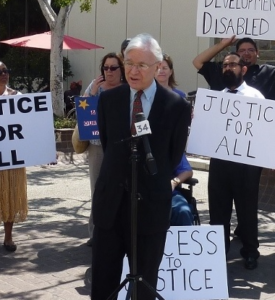For years, we’ve fought the widespread, heartbreaking, infuriating crimes of abuse, neglect, sexual assault, domestic violence, hate crimes, and homicide of people with intellectual and developmental disabilities.
We’ve sponsored and supported bills attacking pieces of the problem and seen some of them passed and signed into law.
We’ve advocated to governors, attorneys general, the Department of Developmental Services, and local police and sheriffs for action, and sometimes gotten it.
We’ve testified at hearings.
We’ve blown the whistle on specific cases we’ve learned about.
We’ve assisted with developing the state’s police training materials.
We’ve led successful projects including reforming the Department of Developmental Services’ internal investigative branch.
We’ve participated in and often led coalitions of civil rights groups and disabilities groups, multiplying our power to act and achieving real results.
We’ve engaged with multiple stakeholders to raise awareness about the rate of victimization within the I/DD community
But we continue to hear from people around the state about horrible crimes against people with disabilities and, sometimes, law enforcement agencies’ inability to arrest and convict the criminals. Research studies stretching back many years confirm what we’ve heard.
Now we may have a chance to make a truly major, statewide change, affecting perhaps tens of thousands of people’s lives for the better.
The Senior and Disability Justice Act, sponsored by The Arc & UCP California Collaborative, and McGeorge Law School’s Elder Law Clinic is an ambitious bill that aims to change the culture of local law enforcement in California to better protect people with disabilities.
Senator Ben Hueso from San Diego this week will introduce the Senior and Disability Justice Act. The bill already has the support of the California Alliance of Retired Americans, the State Long Term Care Ombudsman’s Office, and the United Domestic Workers Alliance/AFSCME.
For the first time, the bill draws together in one place all the particular legal tools and responsibilities that law enforcement agencies have to protect people with disabilities from these major crimes. It strongly encourages all local law enforcement agencies to adopt comprehensive formal policies guiding their officers to use these tools and meet these responsibilities.
The bill, as proposed would include strong accountability steps such as:
Basic training and specific lists of responsibilities for all officers on dealing with victims and witnesses with disabilities.
Requirements that officers take reports on, and investigate, every suspected case of abuse (including neglect), sexual assault, domestic violence, hate crimes or homicide of an adult or child with a disability.
Mandatory arrest of suspects when police find the legally required probable cause, regardless of whether or not there also may be civil (non-criminal) remedies.
Much more extensive training for selected officers in every law enforcement agency, creating a resource within each agency.
Written reports whenever a law enforcement agency’s brass finds unusual compelling circumstances to allow a deviation from the formal policy.
If you know of examples of cases where a policy of this sort would have helped, please let me know.
The Senior and Disability Justice Act has a long, hard road ahead. We need your help.
Thank you for your advocacy.

Greg DeGiere, Civil Rights Coordinator, The Arc of California

